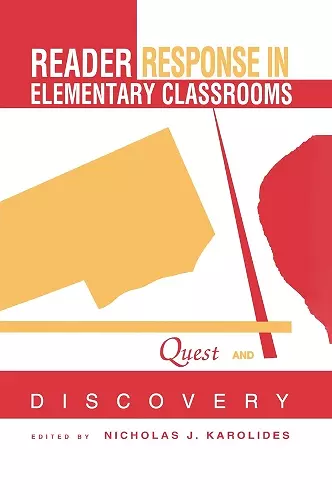Reader Response in Elementary Classrooms
Quest and Discovery
Format:Paperback
Publisher:Taylor & Francis Inc
Published:1st Nov '96
Currently unavailable, and unfortunately no date known when it will be back

Reading is a quest. Likened to an adventure -- both metaphoric and real -- the quest is a journey of discovery. The reader's search encompasses the sensations of the experience itself, accompanying emotions, sense and meaning engendered by the experience, and understandings of the self, others, and the world around. Out of curiosity, readers also search for an extensive array of information. The journey can be envisioned and contemplated again and again after the reading act itself is completed. In a meaningful way, the reader's quest and its discoveries are life enduring and life fulfilling.
The purpose of this volume is two-fold:
* to establish and explore the essential features of reader response theory and its rendering of the reading process, and
* to acknowledge a philosophy of teaching and to illustrate teaching strategies to evoke and enhance readers' responses. Understanding the ways in which the reader affects the reading and how the reading happens will illuminate classroom pedagogy.
This text establishes and explores the essential features of reader response theory and its rendering of the reading process. The essays acknowledge a philosophy of teaching and illustrate a spectrum of teaching strategies to evoke and enhance readers' responses, including whole and small-group discussion; story drama; readers' theatre; journal writing; scripts, letters, stories, and other writings; and "body punctuation." A case study format is used to illustrate these strategies in action in real classrooms.
"The contributors to this volume are a good mix of university and classroom researchers, and each has an interesting story to tell or observation to make. Karolides' commentary preceding each chapter makes thismore than a collection of good ideas, guiding the novice reader to understand how reader response theory can be realized in classroom practice."
—Lee Glada-Pelligrini
University of Georgia
"Teachers in our college learning communities will like this book....the case studies are so clear; there doesn't seem to be any magic needed to support this instructional strategy. I leave with the feeling that I can actually do this."
—R. Kay Moss
Illinois State University
"Reflects current thinking on reader response theory, especially that of Louise Rosenblatt. Other important theory related to reader response is also addressed, including constructivist viewpoints and social interactionist theory....An excellent addition to our professional knowledge base."
—Mary F. Heller
Kansas State University
ISBN: 9780805822601
Dimensions: unknown
Weight: 635g
382 pages